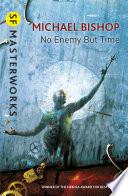“What motivates you, then? Please don’t tell me altruism. I am not quite so gullible as that.”
Source: A Funeral for the Eyes of Fire (1975), Chapter 2, “Covenant: Derringer and Dascra” (p. 41)
Michael Lawson Bishop is an American writer. Over four decades and in more than thirty books, he has created what has been called a "body of work that stands among the most admired and influential in modern science fiction and fantasy literature." Wikipedia
“What motivates you, then? Please don’t tell me altruism. I am not quite so gullible as that.”
Source: A Funeral for the Eyes of Fire (1975), Chapter 2, “Covenant: Derringer and Dascra” (p. 41)
“God could hardly damn me for a coward, great cosmic exemplar of laissez-faire that he is.”
Source: A Funeral for the Eyes of Fire (1975), Chapter 2, “Covenant: Derringer and Dascra” (p. 34)
Source: A Funeral for the Eyes of Fire (1975), Chapter 14, “Denouement: Ascent to the Acropolis” (p. 266)
Source: A Funeral for the Eyes of Fire (1975), Chapter 6, “Inquisition: The Messiah Who Came Too Late” (p. 113)
“Like all such prophecies, it’s impressive only if not examined too closely.”
Source: A Funeral for the Eyes of Fire (1975), Chapter 13, “Aftermath: Sarcophagi and Coffins” (p. 249)
“They had both changed in eight years, eroded or subtly augmented by the sweep of time’s river.”
Source: No Enemy But Time (1982), Chapter 30 “Marakoi, Zarakal” (p. 303)
Source: No Enemy But Time (1982), Chapter 30 “Marakoi, Zarakal” (p. 315; closing words)
Source: A Funeral for the Eyes of Fire (1975), Chapter 4, “Enlightenment: Down on the Edgegleam Plains” (p. 83)
Source: No Enemy But Time (1982), Chapter 18 “In a Season of Drought” (p. 158)
Source: A Funeral for the Eyes of Fire (1975), Chapter 5, “Ambivalence: The Children of the Ouemartsee” (p. 93)
“Both God and man hold each other in equally beautiful contempt.”
Source: A Funeral for the Eyes of Fire (1975), Chapter 11, “Usurpation: Two Meteors, Prodigal of Light” (p. 196)
“Outside the rain continued its cadenced and indifferent commentary.”
Source: A Funeral for the Eyes of Fire (1975), Chapter 12, “Debacle: The Swarmings” (p. 240)
“Necessary is often the mother of light fingers instead of invention.”
Source: No Enemy But Time (1982), Chapter 10 “Fruit of the Looms” (p. 76)
“Don’t look for reason where it’s never been practiced.”
Source: A Funeral for the Eyes of Fire (1975), Chapter 5, “Ambivalence: The Children of the Ouemartsee” (p. 92)
“What was reprehensible in being fearful in the presence of the unknown?”
Source: A Funeral for the Eyes of Fire (1975), Chapter 1, “Planetfall: The Hawks of Conscience” (p. 33)
Source: A Funeral for the Eyes of Fire (1975), Chapter 11, “Usurpation: Two Meteors, Prodigal of Light” (p. 200)
Source: A Funeral for the Eyes of Fire (1975), Chapter 7, “Interlude: Heartseed and Tower” (p. 142)
“Who but a madman would grapple with mountains?”
Source: A Funeral for the Eyes of Fire (1975), Chapter 4, “Enlightenment: Down on the Edgegleam Plains” (p. 75)
Source: A Funeral for the Eyes of Fire (1975), Chapter 2, “Covenant: Derringer and Dascra” (p. 35)
“Coercion is the tool of the desperate.”
Source: A Funeral for the Eyes of Fire (1975), Chapter 3, “Superstitions: A Night Piece” (p. 64)
Source: A Funeral for the Eyes of Fire (1975), Chapter 14, “Denouement: Ascent to the Acropolis” (p. 265)
“Paleoanthropologists were congenitally media-oriented.”
Source: No Enemy But Time (1982), Chapter 17 “Pensacola, Florida” (p. 147)
“You can’t go home again, particularly if you never had one.”
Source: No Enemy But Time (1982), Chapter 23 “Panama City, Florida” (p. 206)
“No, not if you’re narrating a dream. But if you claim, like the Pledgeson, that your visions and reality are the same thing, then, yes I expect consistency. I’m too old for pointless fairy tales.”
Source: A Funeral for the Eyes of Fire (1975), Chapter 7, “Interlude: Heartseed and Tower” (p. 142)
